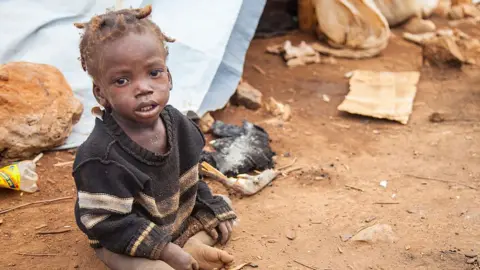Haiti: Child malnutrition surges amid pandemic and crime, Unicef says
 Tony Savino/Corbis via Getty Images
Tony Savino/Corbis via Getty ImagesSevere acute childhood malnutrition is expected to more than double this year in Haiti amid the pandemic, rising crime and low resources, Unicef says.
More than 86,000 children under the age of five could be affected, compared to 41,000 last year, the UN agency said.
Haiti is the poorest country in the Americas, and more than 60% of its population live in poverty.
The country has suffered from decades of political and economic crises as well as several natural disasters.
Violence has also surged recently, with a wave of kidnappings. After a group of Catholic clergy were abducted last month, the Church described the situation as "a descent into hell".
Unicef also said acute malnutrition, which is a less dangerous category than severe acute malnutrition, increased 61% last year, affecting 134,000 children under the age of five. It said the number could rise to about 217,000 this year.
"I was saddened to see so many children suffering from malnutrition," Jean Gough, the Unicef Regional Director for Latin America and the Caribbean, said in a statement after a visit to the country. "Some will not recover unless they receive treatment in time."
About 4.4 million people out of a population of 11 million are estimated to be food insecure in Haiti, including 1.9 million children, according to Unicef. It warned that the upcoming hurricane season - from June to November - is likely to worsen access to nutritious food.
The country also saw a sharp decline in child immunisation rates last year, fuelled in part by the disruption of health services because of the pandemic. Diphtheria cases have risen as a result, and there are fears of a possible measles outbreak this year.
Unicef warned that unvaccinated children were also more vulnerable to suffer and die from malnutrition.
The agency also said that next month it would run out of a special food past given to children in need, and that it urgently needed $3m (£2.1m) to purchase supplies. Overall, it said it needed $48.9m to provide aid this year but that very little of that amount had been pledged.

You may also find interesting
The coronavirus pandemic has not affected all communities equally, with wealth appearing to be a major factor.
The BBC's Stephanie Hegarty looks at some of the reasons why poorer people are more likely to catch - and to die from - Covid-19.
